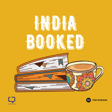
India Booked | Jaipur and Japan: A Kindred Contrast
In the 14th episode of India Booked, author Anukrti Upadhyay takes us through the deserts of Rajasthan and the hot springs of Japan through her novel Kintsugi. In the same conversation, she connects contrasts betweenthe cultures of Jaipur and Japan and creates a delightful echo, all of her own.
Anukrti Upadhyay is also the author of the twin novellas Daura and Bhaunri, which have been commended for its independent characters and fresh narrative, and a short story collection in Hindi called Japani Sarai, making her one of the few bilingual writers in India.
Tune into this episode to hear her and host, Ayushi Mona discuss her inspiration for writing and her thoughts on how books belong more to the readers than the authors themselves. She paints a picture of the striking visual differences in the aesthetics of Japan and India, calling both the cultures “perfect foils to each other” and expresses how people, despite differences in cultures and traditions, are not very different from each other after all.
Tune in for a descriptive treat of an excerpt from the novel Kintsugi by the author herself, as she brings to life the people and the lanes of the Johri Bazar of Jaipur.
